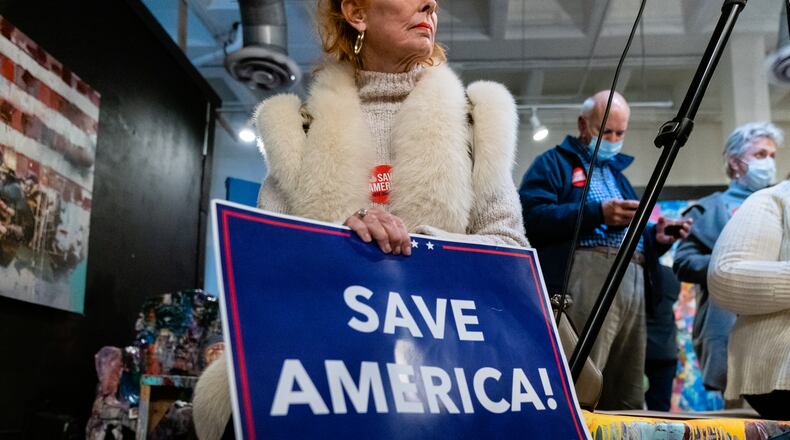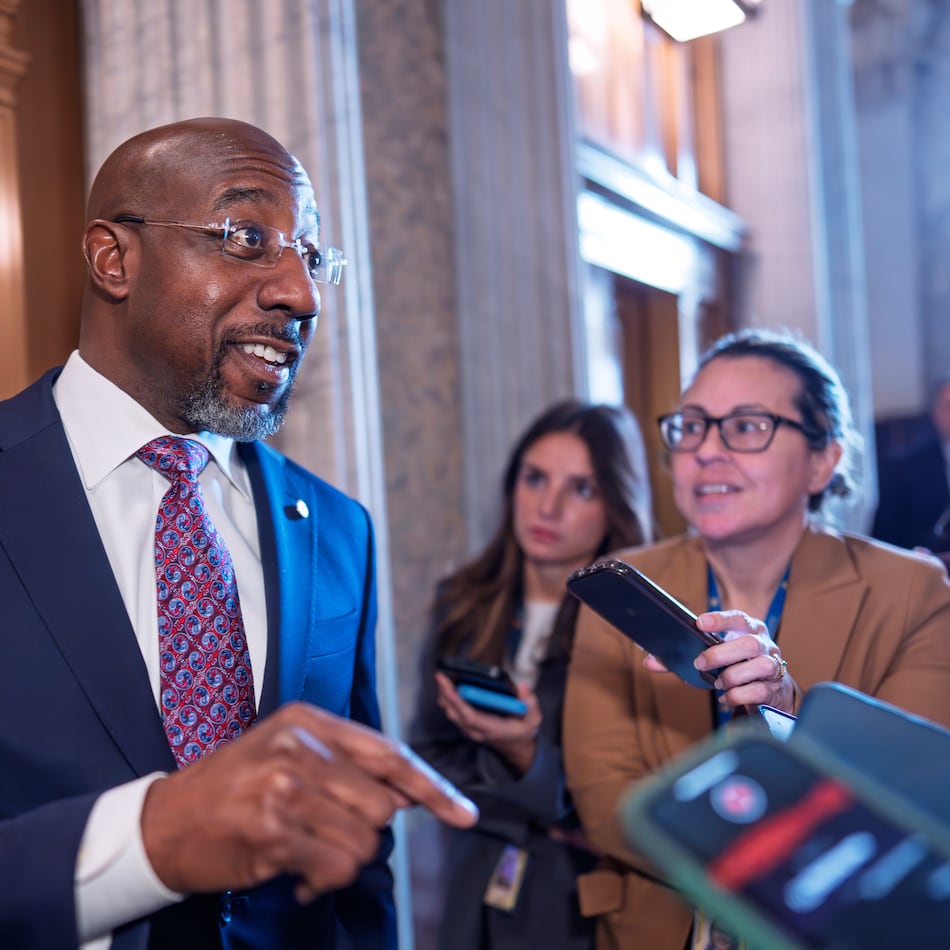Apart from the candidates themselves, political action committees have spent at least $150 million since the November general election to rally voters back to the polls for the Senate runoff, records show.
While nearly two-thirds of that spending has come from super PACs connected to either Senate Majority Leader Mitch McConnell or Minority Leader Chuck Schumer, the rest has come from special interest groups with business before the new Congress.
Brendan Fischer, director of federal reform for the non-partisan Campaign Legal Center in Washington, D.C., said spending by PACs in the Georgia runoffs is akin to an arms race financed by “a small handful of extremely wealthy interests.”
“Elections increasingly look like a battle between billionaires and millionaires. My biggest concern is what happens after the election,” he said. “Very often they expect something in return and very often they get it.”
Fischer said sometimes that’s a political favor or a listening ear. It could be something that helps the donor’s bottom line or it might be a social issue or cause that’s important to them. Either way, he said, it’s access regular voters can’t get.
That’s not the message voters likely will hear from the PACs themselves, which are presenting the Jan. 5 runoffs in the starkest of terms.
“These two races will determine control of the Senate, and it’s vital that we prevent radical liberals from turning every American institution that we cherish into a vehicle for their ultimate goal of imposing socialism on our country,” Club For Growth President David McIntosh said in a statement earlier this month.
This week, the conservative super PAC kicked off a “Save America” bus tour around the state, complete with Republican celebrities, like former Alaska Gov. Sarah Palin and country music star Lee Greenwood. The Club For Growth stayed out of the Georgia races until mid-November, but the PAC recently pledged to spend $10 million to support the reelections of Sens. David Perdue and Kelly Loefller.
On the Democratic side, the American Bridge 21st Century super PAC jumped into the race in late November and is spending about $1 million a week on ads aimed at riling up liberal voters to support Jon Ossoff and the Rev. Raphael Warnock.
“Kelly Loeffler and David Perdue are using their offices to make money for themselves while they slash funding for Georgia’s rural hospitals and support devastating cuts to Medicare and Social Security,” PAC president Bradley Beychok said in an announcement this week of a $3.6 million ad buy. The super PAC has pledged to spend as much as $12 million on the race.
Business, social issues dominate
Behind all that money are wealthy individual donors, trade unions and so-called “dark money” organizations pushing national agendas that play as well in New York, Texas or California as they do in Georgia.
For example, the Club For Growth’s top donor is Richard Uihlein, a billionaire Republican megadonor and CEO of Wisconsin shipping and packing firm Uline. Uihlein is known for his opposition to government regulations and has contributed $24.5 million to the super PAC for the 2020 election. In in the past year his company has lobbied the federal government to loosen restrictions on the hours truck drivers can be on the road and to increase the length of double-trailer trucks, according to lobbyist disclosures.
Another large donor is Jeff Yass, an options trader and founder of Philadelphia-based Susquehanna International Group. Yass sits on the board of the libertarian think tank the Cato Institute, and is a powerful advocate for school choice and the expansion of charter schools.
More broadly, the Club for Growth pushes a host of mainline, business-friendly issues, including free trade, lowering the income tax and passing tort reform.
The American Bridge PAC received millions in donations from liberal non-profits that don’t have to disclose their donors, but millions more came from wealthy donors like Indiana shopping mall heiresses Deborah Simon and Cynthia Simon-Skjodt. Since 2016, the sisters have emerged as big donors to progressive groups, reportedly due to their interest in fighting abortion restrictions and promoting issues like gay rights. In the 2020 election cycle, the two women gave a combined $7.8 million to American Bridge.
American Bridge itself is largely an opposition research organization, sending “trackers” to Republican events and digging into candidates’ pasts and paper trails in the search for scandal. In Georgia, the PAC recently began airing ads aimed at undermining Perdue and Loeffler’s rural voting base by portraying them as rich and corrupt.
Wall Street money for Loeffler
With two Senate seats up for grabs, Georgia was a novelty this election cycle. Even so, outside groups didn’t begin pouring money into the races until recently. Non-candidate committees have spent $217.6 million on the races between October and mid-December, five times the amount spent the prior three months, according to the AJC’s analysis.
While there was significant spending on the Perdue-Ossoff race, especially in October leading up to the general election, the other seat didn’t attract much money. PACs largely stayed out of that race, which featured a 21-candidate slate, until Loeffler and Warnock emerged as the two candidates in a runoff.
Since then, special interest groups have jumped into the fray with negative ads. Outside groups have spent $37.1 million in opposition to Warnock, most of it spent since the November general election. Democratic PACs have spend about $13 million opposing Loeffler over that same time.
MeidasTouch, a progressive super PAC created earlier this year by three brothers initially to oppose President Trump’s reelection, has turned its attention to the Georgia races. The super PAC has produced a number of online ads targeted at social media and spent at least $777,000 on mailers, billboards and television ads in a push to turn the Senate Democratic.
“Our priority right now is taking back the Senate,” Brett Meiselas told The Hollywood Reporter in an interview last month. “I would say Georgia is our main focus and deploying our resources and really doing everything we can in the same fashion that we did during the general election for these runoff elections.”
Georgia United Victory is spending millions campaigning for Loeffler and against Warnock (and to a lesser degree, Ossoff), thanks to weighty contributions from Jeffrey Sprecher, Loeffler’s husband, and some of his Wall Street colleagues.
Sprecher has given $5.5 million to the PAC. But Sprecher isn’t the only notable Wall Street donor. Ken Griffin, founder of Citadel Securities, has donated $3 million to Georgia United Victory. This past week, Salon reported Griffin, who is a large Republican donor, made the donations in the midst of acquiring one of its competitors in a deal that required approval by the New York Stock Exchange. Sprecher is chairman of the exchange.
In its most recent report, Georgia United Victory reported $1.3 million spent in digital advertising opposing Warnock and Ossoff and $1.8 million in texting and phone-banking for Loeffler and Perdue.
Liberal groups back Warnock
Outside groups also are spending to support Warnock. Federal Election Commission records show $14.3 million spent so far. Most of that money flowed over the last two months, with millions spent in the weeks prior to the election when optimists hoped the pastor could win the election outright.
One big spender is the Brooklyn-based Working Families Party, which has expended $953,500 supporting Warnock, almost as much as the group spent on President-elect Joe Biden. The WFP advocates a number of far-left positions, including ending systemic racism by “shift(ing) resources away from policing, jails and detention centers,” a $15 minimum wage, and nationalizing energy companies to wean them from fossil fuels. In 2014, Politico described the WFP as “if the left had a tea party.” It largely is funded through a combination of small, individual donations and larger contributions from other left-leaning PACs.
Another New York-based PAC, the Black PAC, has spent $765,000 on Warnock, mostly on door-to-door canvassing. Another group, the Washington-based Black Progressive Action Coalition, has spent another $362,000 supporting Warnock. Both groups support progressive Black candidates and advocate for criminal justice reform and narrowing the wealth gap.
Fischer of the Campaign Legal Center said the Georgia races illustrate the continued role big money donors and powerful PACs play in how we elect our leaders. That’s unlikely to change without a significant push by voters putting pressure on politicians, he said.
“It’s not an unfixable problem,” he said. “The senators who are the subject of all of these ads would have the opportunity to try and do something about it.”
About the Author
Keep Reading
The Latest
Featured



